- Evolution of Retail IT Services
- 1. Early Adoption of Technology
- 2. Introduction of Point-of-Sale Systems
- 3. Rise of E-commerce
- 4. Omnichannel Retailing
- 5. Integration of Advanced Analytics and Artificial Intelligence
- 6. Emphasis on Cybersecurity and Data Protection
- 7. Adoption of Emerging Technologies
- Applications of IT services in Retail Industry
- 1. Managed Cloud Services for Retail Management Systems
- 2. Cybersecurity Managed Services
- 3. Managed Network Services
- 4. Point-of-Sale System Management
- 5. Data Backup and Recovery Services
- 6. End-User Support and Helpdesk Services
- 7. Mobile Device Management
- 8. IT Infrastructure Monitoring and Management
- 9. Vendor Management Services
- 10. Compliance and Regulatory Service
- 11. Business Intelligence and Analytics Services
- 12. Emerging Technology Integration Services
- 13. Automated Checkout Systems
- 14. Intelligent Inventory Management
- 15. Dynamic Pricing Optimization
- 16. AI-Powered Visual Search
- 17. Robotic Process Automation in Supply Chain Management
- Challenges for Retail IT Services
- 1. Managing Inventory Overhead
- 2. Hiring and Retaining Talent
- 3. Driving Qualified Leads
- 4. Legacy Systems Integration
- 5. Data Security and Privacy Concerns
- 6. Omnichannel Integration
- 7. Scalability and Flexibility
- 8. Vendor Management
- 9. Compliance with Regulations
- 10. Customer Experience Enhancement
- Appinventiv: Your Trusted Partner for Retail Software Development
- FAQs
The retail industry is evolving faster than ever, and for the participants, staying ahead means embracing the power of technology. As a retailer, it is not uncommon for you to face increasing pressure to deliver seamless customer experiences while managing complex operations behind the scenes. IT lies at the center of this transformation, enabling retailers to streamline processes, secure sensitive data, and adapt to shifting market demands.
From optimizing retail management systems to leveraging business intelligence, IT solutions for the retail industry provide the tools and capabilities to drive efficiency and innovation. They ensure that your operations run smoothly, your customers remain satisfied, and your business stays competitive in an ever-changing market.
For example, your customers visit your shop and are warmly welcomed by personalized offers pertinent to their interests. As they navigate your inventory, retail business intelligence has foreseen their needs: recommending associated products. To pay? A hassle-free, single-click affair. This isn’t tomorrow’s dream alone but reality in the present given by high-end retail IT services.
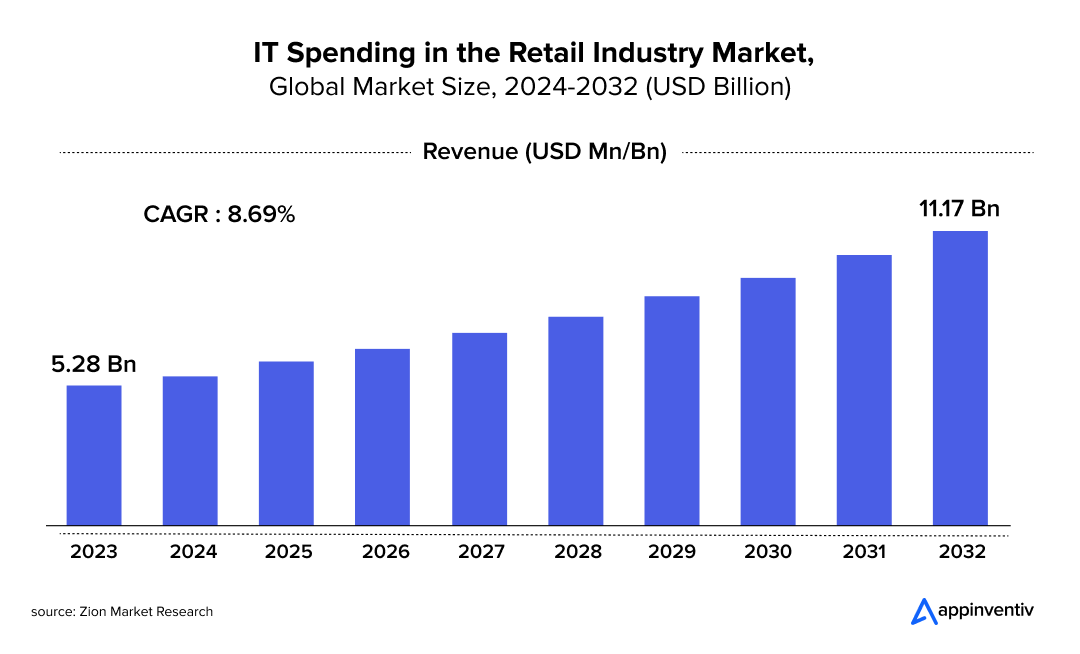
This article explores how IT services for retail are redefining the sector’s operations. From POS system management to integrating emerging technologies, discover how these solutions can help address challenges, uncover opportunities, and transform the retail experience for businesses and customers.
Boost sales, streamline operations, and deliver exceptional customer experiences with tailored retail solutions to elevate your business. Book your quote now!
Evolution of Retail IT Services
The retail industry has undergone significant transformation over the years, with IT services playing a pivotal role in this evolution. To truly understand where the technology stands today, it is important to get a concise overview of how retail IT services have progressed over time:
1. Early Adoption of Technology
In the late 19th and early 20th centuries, retailers began utilizing basic technologies like cash registers and mechanical calculators to streamline transactions and manage inventory.
2. Introduction of Point-of-Sale Systems
The 1970s and 1980s marked the advent of electronic systems that replaced traditional cash registers. These IT services for retail integrated sales, inventory management, and customer data, laying the foundation for more sophisticated retail operations.
3. Rise of E-commerce
The 1990s and early 2000s saw the emergence of online shopping platforms, compelling businesses to develop infrastructure around retail IT services that supported physical and digital storefronts. This shift necessitated robust website management, online payment processing, and cybersecurity measures.
4. Omnichannel Retailing
As digital technologies advanced, retailers adopted the IT strategy of business to provide seamless customer experiences across various platforms, including physical stores, websites, and mobile applications. This approach required integrated retail IT services and solutions that uniformly manage customer interactions and data across all channels.
5. Integration of Advanced Analytics and Artificial Intelligence
In recent years, incorporating advanced technologies has enabled retailers to analyze vast amounts of data, facilitating personalized marketing, inventory optimization, and enhanced customer service. For instance, machine learning in the retail sector is now widely used to create customized offers for loyalty program members.
6. Emphasis on Cybersecurity and Data Protection
With the increasing digitization of retail operations, safeguarding customer data and ensuring secure transactions have become paramount. In this phase of the IT services for retail evolution, businesses invested heavily in cybersecurity measures to protect against data breaches and cyber threats.
7. Adoption of Emerging Technologies
The latest phase involves integrating innovations like the Internet of Things, virtual reality, Artificial Intelligence, and Augmented Reality to enhance customer engagement and streamline operations. These technologies are reshaping the retail landscape by offering immersive shopping experiences and efficient supply chain management.
Also Read: How Technology in Supply Chain Can Surpass Challenges
This evolution of IT support for retail highlights the industry’s continuous adaptation to technological advancements, aiming to meet changing consumer expectations and improve operational efficiency.
With the sector evolving from brick-and-mortar stores to omnichannel experiences, the role of IT in the retail industry has become indispensable. The journey from basic cash registers to integrated POS systems and from manual inventory checks to automated analytics underscores a clear trajectory – technology is the cornerstone of retail transformation.
This evolution has also laid the foundation for various innovative applications that optimize operations and redefine how retailers connect with their customers. For example, the merger of the IT and retail industries enables businesses to meet the demands of the modern shopper, streamline backend processes, and remain resilient in a rapidly changing market.
Below, we delve into specific use cases that showcase IT services’ role in retail and transforming challenges into opportunities while paving the way for future growth.
Applications of IT services in Retail Industry
The integration of retail IT support has streamlined operations and provided a competitive edge to businesses. Below is an in-depth look into how IT services are utilized in the retail industry:
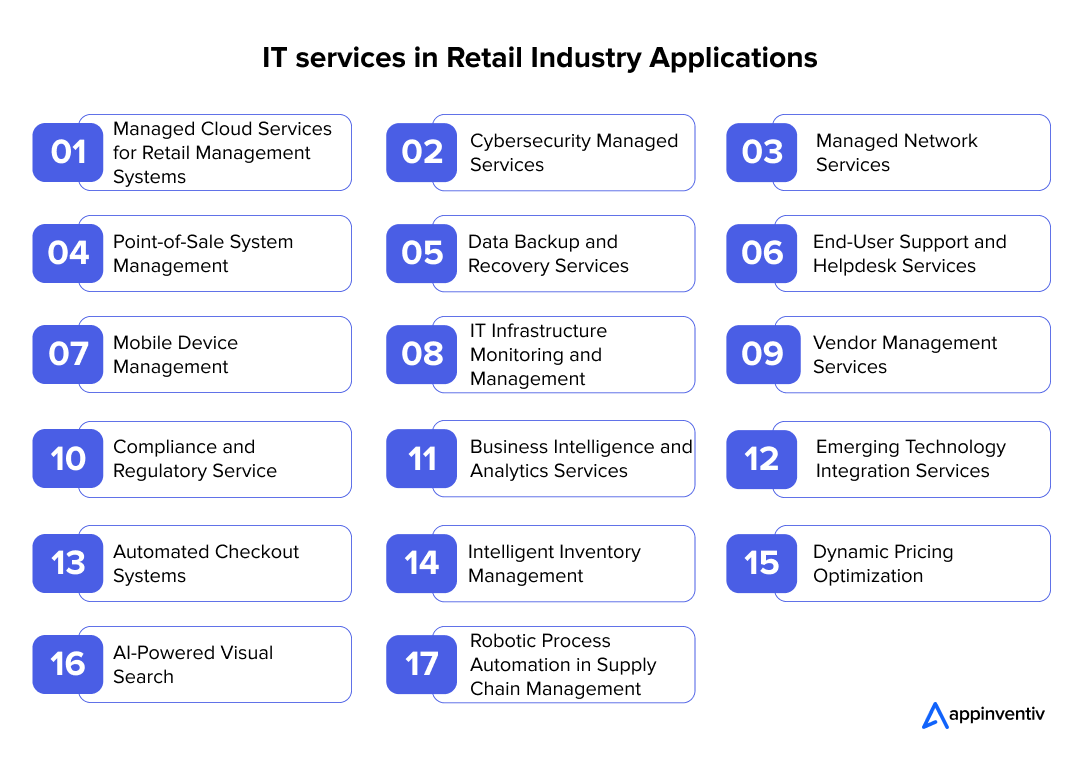
1. Managed Cloud Services for Retail Management Systems
One of the main benefits of retail IT services lies in the cloud. Retailers use cloud-based systems to handle essential functions such as inventory management, sales tracking, and customer relationship management. These services enable seamless data synchronization across multiple stores and ensure real-time updates.
Additionally, the scalability of cloud services allows businesses to expand operations without investing heavily in physical IT infrastructure. Cloud computing in e-commerce also provides enhanced disaster recovery options, as data is securely stored and easily retrievable.
For example, YK Almoayyed, a top distributor in Bahrain, collaborated with Appinventiv to develop a cloud-based retail and distribution platform.
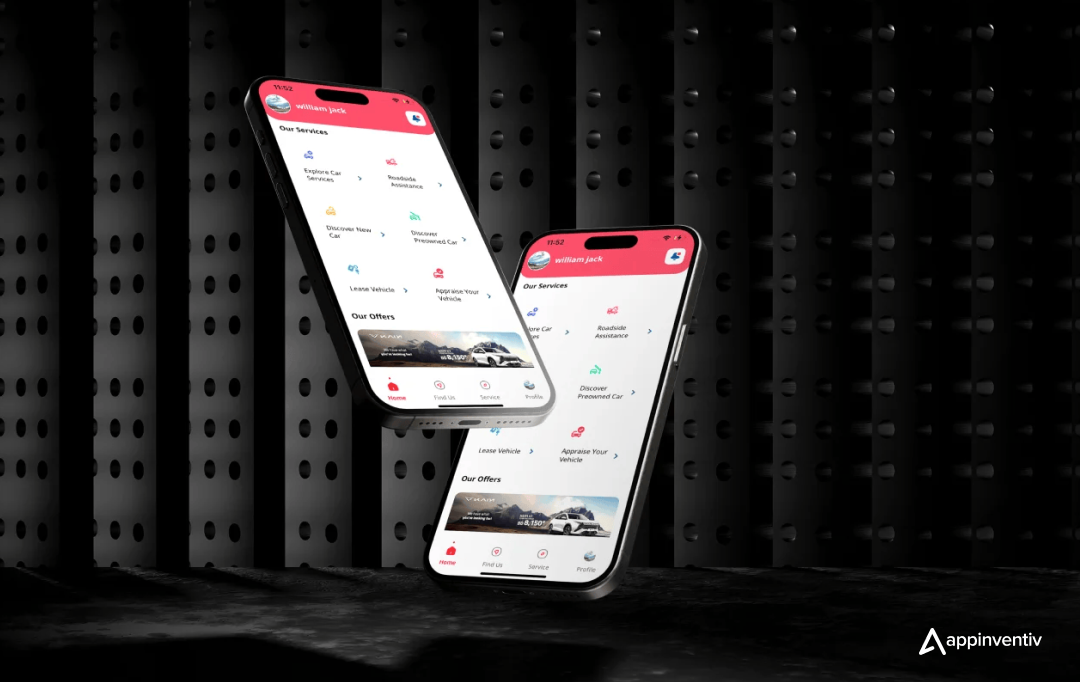
- The platform aimed to streamline business processes, including supply chain management, order processing, and inventory handling, by providing real-time data visibility and automating key tasks.
- It seamlessly integrated sales, warehouse management, and customer service functions, enhancing operational efficiency and collaboration across departments.
The solution’s scalable infrastructure allowed UK Almost to grow easily, while real-time analytics empowered better decision-making.
2. Cybersecurity Managed Services
With the growing dependency on digital platforms, retailers face increased risks of data breaches and cyber-attacks. Cybersecurity retail IT managed services that protect customer payment details, personal data, and company-sensitive information.
Services include real-time threat monitoring, regular vulnerability assessments, and incident response management. The cybersecurity measures and proactive approach help prevent revenue losses and reputational damage associated with security breaches.
3. Managed Network Services
A robust and reliable network is the backbone of modern retail operations. Retail IT-managed services can ensure uninterrupted connectivity for POS systems, in-store devices, and customer Wi-Fi.
These services also include monitoring for bandwidth optimization, ensuring smooth operations even during peak shopping times. Centralized network management allows streamlined coordination across all branches for retailers with multiple locations.
4. Point-of-Sale System Management
POS systems are more than just cash registers; they integrate inventory management, customer loyalty programs, and sales analytics. In line with this, one of the key use cases for retail IT services can be seen in how it ensures the smooth functioning of these systems by providing regular updates, troubleshooting, and integration with other platforms, such as e-commerce websites.
Modern POS systems also support multiple payment methods, including digital wallets and contactless payments, enhancing the customer experience.
5. Data Backup and Recovery Services
Data loss can be catastrophic for retailers, affecting everything from inventory records to customer information. Solutions for retail IT services and support offer automated data backup solutions that ensure data is consistently saved without manual intervention.
In case of hardware failures or cyber-attacks, recovery services allow businesses to restore data quickly, minimizing downtime and operational disruptions.
6. End-User Support and Helpdesk Services
Retail staff rely on various IT tools and systems for daily operations. One of which IT helpdesk services provides real-time support for troubleshooting issues, ensuring that employees can focus on customer service rather than technical problems.
These IT solutions for retail companies often include remote assistance, on-site support, and regular system health checks to prevent recurring issues.
7. Mobile Device Management
Mobile devices like tablets and handheld scanners are integral to modern retail environments. MDM IT services for retail ensure that these devices are secure, updated, and compliant with company policies.
This includes managing access controls, monitoring device usage, and deploying necessary updates remotely. With MDM, retailers can reduce device-related risks and enhance operational efficiency.
8. IT Infrastructure Monitoring and Management
The complexity of Retail IT services and solutions infrastructure requires constant monitoring to ensure optimal performance. IT services use advanced tools to monitor servers, networks, and applications in real-time – a proactive approach that helps identify potential issues before they escalate, ensuring smooth operations.
Services around infrastructure monitoring can also include capacity planning, helping retailers avoid system overloads during high-demand periods.
9. Vendor Management Services
Retailers often rely on multiple vendors for various IT tools and solutions. Vendor management IT support for retail streamlines these relationships by handling contracts, performance evaluations, and issue resolution.
This ensures that all third-party tools and services work harmoniously, eliminating inefficiencies and reducing costs associated with mismanaged vendor relationships.
10. Compliance and Regulatory Service
The retail sector is subject to numerous regulations, including data protection laws and payment card industry standards. Compliance-oriented IT solutions for the retail industry ensure that all systems meet these requirements, reducing the risk of fines and legal challenges.
This includes regular audits, policy updates, and employee training to maintain compliance across all operations.
11. Business Intelligence and Analytics Services
Retailers generate massive amounts of data daily, from sales transactions to customer interactions. Business intelligence-focused IT solutions for retail help analyze this data to provide actionable insights, such as identifying sales trends, optimizing pricing strategies, and enhancing inventory management.
Predictive analytics also enable retailers to anticipate customer preferences and tailor their offerings accordingly.
12. Emerging Technology Integration Services
Technologies like AI, IoT, and AR are transforming the retail landscape. IT in the retail industry facilitates the integration of these technologies into existing systems. AI-driven chatbots enhance customer service, IoT devices enable real-time inventory tracking, and AR applications create immersive shopping experiences. These innovations help retailers stay ahead in an increasingly competitive market.
For example, Appinventiv built an ERP solution for IKEA stores that helps walk-in customers go through the store’s product catalogs right from the store-erected tablet panel.
Our dedicated efforts behind the ERP solution development led to the creation of a solution that is today expanding the 7+ IKEA stores in the UAE. The retail outlet touts the solution as the biggest source of ROI measurement.
Discover how we helped IKEA transform its shopping experience into a sleek, user-friendly ERP platform, crushing customer expectations and driving insane engagement.
13. Automated Checkout Systems
Automated checkout solutions use advanced technologies like AI in retail and computer vision to streamline the process. By eliminating the need for human intervention, these dedicated IT services for retail reduce wait times and enhance customer satisfaction. They also minimize billing and inventory update errors, ensuring greater operational accuracy.
Also Read: 10 Ways to Deploy Computer Vision For Your Retail Business
14. Intelligent Inventory Management
AI-powered inventory management system uses historical sales data, seasonal trends, and real-time analytics to optimize stock levels. The merger of the IT and retail industries ensures that popular items are always available while minimizing slow-moving inventory. Such systems also reduce waste by accurately forecasting demand, particularly perishable goods.
15. Dynamic Pricing Optimization
Businesses leverage IT services in the retail industry to implement dynamic pricing strategies. Algorithms analyze competitor pricing, market demand, and customer behavior to adjust prices in real-time. This approach maximizes profitability while ensuring that products remain competitively priced.
16. AI-Powered Visual Search
Visual search tools allow customers to find products using images rather than keywords. This enhances the shopping experience, particularly in categories like fashion and home décor, where visuals play a significant role. Commerce entrepreneurs can integrate these tools into their websites and mobile apps to boost engagement and conversions and back it up with proactive, well-strategized retail IT support.
17. Robotic Process Automation in Supply Chain Management
RPA solutions automate repetitive tasks in the supply chain, such as order processing and invoice generation. This reduces manual errors and accelerates operations, allowing retailers to fulfill orders more efficiently. RPA also enhances supply chain visibility, enabling better decision-making.
These use cases highlight the transformative impact of IT solutions for the retail industry, enabling businesses to adapt to evolving customer expectations and market dynamics.
While applications of IT services in retail offer significant advantages, integrating these solutions comes with challenges. While technologies like cloud services, cybersecurity, and data analytics in retail can streamline operations and improve customer experiences, retailers must overcome obstacles such as managing legacy systems, ensuring data security, and handling scalability issues.
Addressing these challenges is crucial to fully harness the potential of IT services and ensure that retail businesses can thrive in an increasingly complex environment. This complex process calls for a partnership with It consultation services experts.
Challenges for Retail IT Services
Integrating Information Technology into retail operations has brought numerous advancements. Still, it also comes with challenges that retailers must navigate to ensure smooth operations, efficiency, and competitiveness.
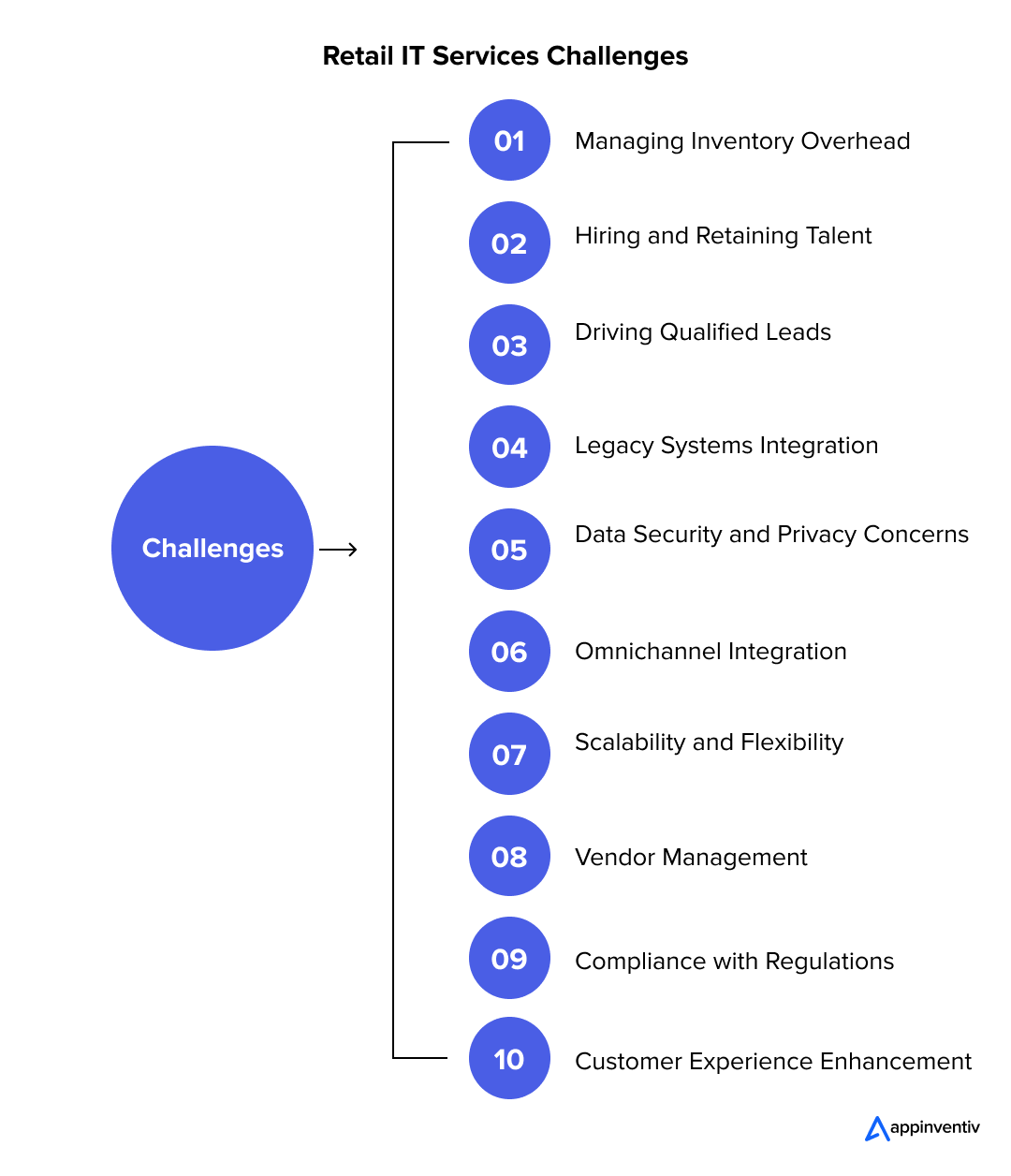
1. Managing Inventory Overhead
One of the most pressing challenges is managing inventory levels. Overstocking can increase holding costs and potential markdowns, while understocking can lead to missed sales opportunities. To strike the right balance, retailers need effective inventory management systems that optimize stock levels, reduce waste, and ensure products are available when customers want them.
2. Hiring and Retaining Talent
As technology evolves, attracting and retaining skilled IT professionals becomes increasingly crucial. However, the competitive job market and high turnover rates make this a challenge for many retailers.
To overcome this, retailers must focus on comprehensive talent management strategies, including training, professional development, and creating a work environment that encourages long-term employee retention. While very productive, this also comes at the cost of retail IT services.
3. Driving Qualified Leads
In today’s digital-first world, simply having an online presence isn’t enough. Retailers must adopt targeted marketing strategies that attract and convert qualified leads. By improving their digital marketing efforts and leveraging customer data, retailers can optimize conversion rates, enhance their reach, and boost customer engagement in an increasingly crowded marketplace.
4. Legacy Systems Integration
Many retailers still rely on outdated legacy systems incompatible with modern IT strategies and technologies. This disconnect hampers efforts to digitize and transform operations. Upgrading or replacing these systems requires significant time, money, and resources and presents operational risks during the transition. However, it is necessary to develop a core IT modernization strategy to make the retail environment efficient in the long term.
5. Data Security and Privacy Concerns
With the growth of online shopping, data security has become a major concern for retailers and customers. Protecting sensitive customer information and transaction data from breaches is essential. Retailers must invest in robust cybersecurity solutions, implement best practices for data protection, and ensure compliance with regulations to prevent security threats and maintain consumer trust.
6. Omnichannel Integration
To meet the demands of today’s shoppers, retailers must provide a seamless experience across multiple channels – whether online, in-store, or via mobile apps. Achieving this integration is complex and requires the unification of disparate systems. Retailers must ensure that data, pricing, and product information are consistent across all channels and that customers can easily switch between them for a smooth shopping experience.
7. Scalability and Flexibility
As the retail landscape continues to evolve, scalability and flexibility are critical. Retailers must ensure their IT infrastructure can grow alongside their business and adapt to changing market conditions. Whether handling increased traffic during peak seasons or adjusting to shifts in consumer behavior, IT solutions must scale efficiently to meet current and future needs.
8. Vendor Management
Retailers often work with multiple technology vendors for different services, from POS systems to customer analytics tools. Managing these vendors effectively can be challenging as retailers must ensure that all third-party services and solutions integrate smoothly, reduce inefficiencies, and align with the retailer’s business goals.
Fostering strong relationships with vendors while carefully managing service agreements is essential to avoid disruptions in operations.
9. Compliance with Regulations
The retail industry is subject to numerous regulations, including data protection laws, payment card industry standards, and tax compliance requirements. Keeping track of these regulations and ensuring all systems and processes comply is a significant challenge. Retailers must implement continuous monitoring and updates to their IT infrastructure to ensure ongoing compliance, reduce risks, and avoid costly fines.
10. Customer Experience Enhancement
Finally, providing an exceptional customer experience is a constant challenge for retailers. Consumers expect personalized, frictionless experiences both online and offline. Retailers must leverage IT services to enhance customer engagement, streamline interactions, and provide tailored recommendations.
Retailers can meet and exceed customer expectations using data-driven insights and advanced technologies like AI, fostering loyalty and boosting sales.
Let’s talk strategy and innovation today—our team’s got the know-how to get you ahead of the curve. Click below to see how we can make it happen!
Appinventiv: Your Trusted Partner for Retail Software Development
While these challenges may seem daunting, addressing them head-on with the right IT strategies, technologies, and approaches can help retailers thrive in an increasingly competitive and complex landscape. IT services can significantly improve efficiency, customer satisfaction, and profitability with the right tools.
As the retail industry embraces IT services, the right solutions can pave the way for operational efficiency, enhanced customer experiences, and business growth. However, overcoming the challenges associated with these technologies requires expertise, a deep understanding of the retail landscape, and the ability to integrate and manage complex systems.
This is where Appinventiv fits in.
As a leading retail software development company, we bring extensive experience in delivering tailored IT solutions that address the unique challenges faced by retailers. From streamlining legacy system integrations to implementing cutting-edge technologies, our team helps retailers leverage the power of IT to enhance their operations, drive innovation, and deliver exceptional customer experiences. With a focus on scalable, secure, and efficient solutions, we ensure that retailers can stay ahead of the curve in today’s rapidly evolving market.
FAQs
Q. What is retail support?
A. Retail support involves services that help businesses manage daily operations, from IT assistance to customer service and inventory management. It ensures smooth business functions, addresses system issues, and enhances customer experiences.
Q. What retail industry IT services can help cut costs?
A. Retail IT services that can reduce costs include:
- Cloud Services – Reduces the need for expensive on-site infrastructure.
- Data Backup and Recovery – Minimizes downtime and recovery costs
- POS System Management – Streamlines transactions and inventory, lowering manual work.
- Managed Network Services – Ensures network reliability and prevents costly disruptions.
- Vendor Management – Optimizes supplier relationships and reduces overhead.
- Business Intelligence – Helps identify cost-saving opportunities and improve decision-making.
These services help retailers improve efficiency and reduce operational costs.


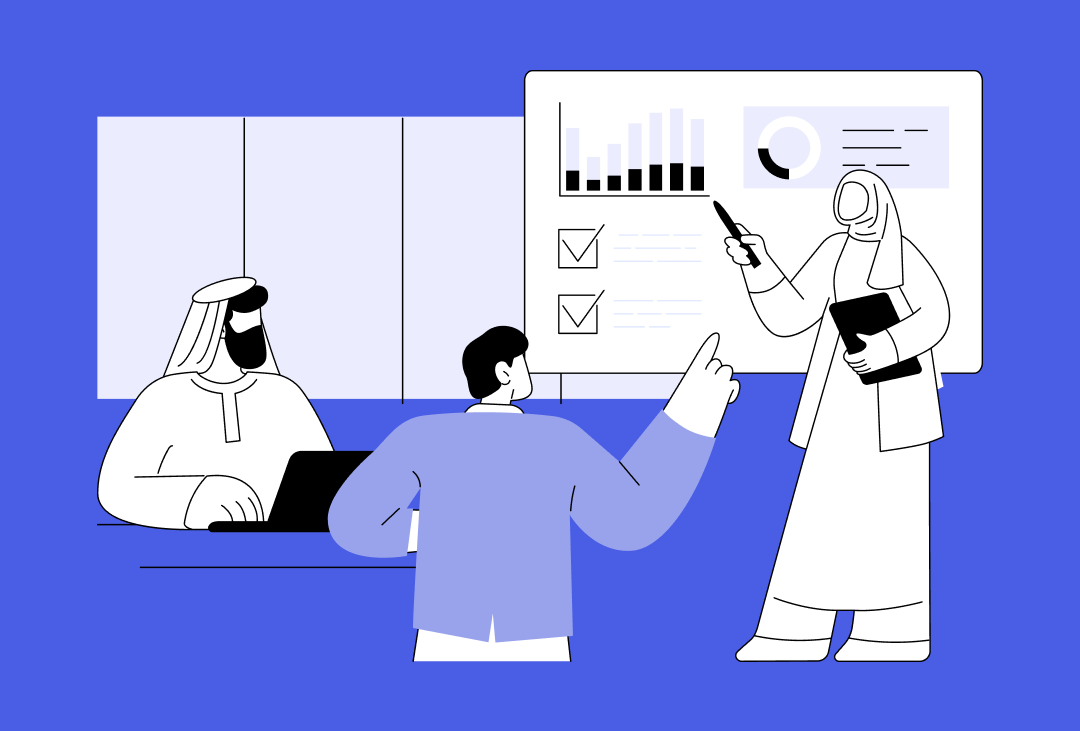
Why Partnering with an IT Consulting Company in Dubai is Essential for Your Business
Dubai's rapid evolution into a global business hub is a testament to its strategic digital transformation initiatives, many of which have been propelled through IT outsourcing partnerships. In recent years, the UAE's technology sector has experienced significant growth, driven by ambitious government programs such as the Dubai 10X initiative and the UAE Artificial Intelligence Strategy…

10 Business-Critical Benefits of Managed Security Services
Every business today, regardless of size or industry, operates in a digital battlefield. Cyber threats are evolving at an unprecedented pace, outstripping the capabilities of traditional security measures. A single breach can trigger financial losses, operational disruptions, reputational damage, and regulatory penalties - impacts that extend far beyond IT teams and into the core of…

Managed IT Services for Manufacturing - An Explorative Guide for CIOs
Key takeaways: The IT services provided can maximize production process efficiency through proactive monitoring, reduced downtime, and faster operations. Latent cybersecurity safeguards correspond to the intellectual assets and intelligence within the business relating to business continuity in a virtual reality. With fixed-price models, unforeseen IT costs are eliminated, allowing for the consolidation of resources and…


















